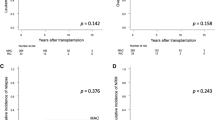Abstract
To identify factors affecting transplant outcome, data from 65 Philadelphia Chromosome-positive acute lymphoblastic leukemia (Ph + ALL) patients who had undergone allogeneic hematopoietic transplantation (allo-HSCT) in our institution were analyzed. The probability of OS (overall survival) and DFS (disease free-survival) at 3 years after allo-HSCT was 40.1 % and 38 %, respectively. Multivariate analysis showed that gender and disease status (p = 0.0059, p = 0.0039, respectively) were significant factors for OS. Among 51 patients with CR (complete remission), multivariate analysis showed that the factors associated with OS included gender (p = 0.014), number of white blood cell at diagnosis (p = 0.025), and the source of stem cells (bone marrow <BM >versus. cord blood; BM stem cell source was associated with favorable OS, p = 0.042). Twenty-one patients relapsed after allo-HSCT with a median of 207 days (range, 19–1,324 days). The estimated cumulative incidence of relapse at 3 years was 39.4 %. Patients with CR showed a lower relapse rate at 3 years (34.2 %) when compared with patients with non-CR (62.7 %). Among 21 patients, eight patients received imatinib-based chemotherapy and 13 received chemotherapy without imatinib before HSCT. In terms of treatment after relapse, seven patients received chemotherapy with imatinib and 13 received chemotherapy without imatinib. Five patients underwent a second HSCT. One patient survived, and 20 patients died. In this study, disease status at time of allo-HSCT had a significant impact on OS, DFS, and relapse. Imatinib administration given before allo-HSCT was not associated with favorable outcome. Second-generation tyrosine kinase inhibitors may be more suitable candidates for Ph + ALL before and after allo-HSCT.



Similar content being viewed by others
References
Gleissner B, Gokbuget N, Bartram CR et al (2002) Leading prognostic relevance of the BCR-ABLtranslocation in adult acute B-lineage lymphoblastic leukemia: a prospective study of the German Multicenter Traial Group and confirmed polymerase chain reaction analysis. Blood 99:1536–1543
Vinetti M, Fazi P, Cimino G et al (2007) Imatinib plus steroids induces complete remissons and prolonged survival in elderly Philadelphia chromosome-positive patients with acute lymphoblastic leukemia without additional chemotherapy:results of the Gruppo Italiano Malattie Ematologiche dell’Adulto (GI-MEMA) LAL0201-B protocol. Blood 109:3676–3678
Lee S, Kim YJ, Min CK et al (2005) The effect of first-line imatinib interim therapy on the outcome of allogeneic stem cell transplantation in adults with newly diagnosed Philadelphia chromosome-positive acute lymphoblastic leukemia. Blood 105:3449–3457
Lee HJ, Thompson JE, Wang ES et al (2011) Philadelphia chromosome-positive acute lymphoblastic leukemia: current treatment and future perspectives. Cancer 117:1583–1594
Yanada M, Naoe T, Iida H et al (2005) Myeloablative allogeneic hematopoietic stem cell transplantation for Philadelphia chromosome-positive acute lymphoblastic leukemia in adults: significant roles of total body irradiation and chronic graft-versus-host disease. BMT 26:867–872
Kebriaei P, Saliba R, Rondon G et al (2012) Long-term follow-up of allogeneic hematopoietic stem cell transplantation for patients with Philadelphia chromosome-positive acute lymphoblastic leukemia: impact of tyrosine kinase inhibitors on treatment outcomes. Biol Blood Marrow Transplant 18:584–592
Fielding AK, Rowe JM, Richards SM et al (2009) Prospective outcome data on 267 unselected adult patients with Philadelphia chromosome-positive acute lymphoblastic leukemia confirms superiority of allogeneic transplantation over chemotherapy in the pre-imatinib era: results from the International ALL Trial MRC UKALLXII/ECOG 2993. Blood 113:4489–4496
Mizuta S, Matsuo K, Yagasaki F et al (2011) Pre-transplant imatinib-based therapy improves the outcome of allogeneic hematopoietic stem cell transplantation for BCR-ABL-positive acute lymphoblastic leukemia. Leukemia 25:41–47
Mizuta S, Matsuo K, Maeda T et al (2012) Prognostic factors influencing clinical outcome of allogeneic hematopoietic stem cell transplantation following imatinib-based therapy in BCR-ABL-positive ALL. Blood Cancer J 2:e72
Spinelli O, Peruta B, Tosi M et al (2007) Clearance of minimal residual disease after allogeneic stem cell transplantation and the prediction of the clinical outcome of adult patints with high-risk acute lymphoblastic leukemia. Haematologica 92:612–618
Burke MJ, Troz B, Baker KS et al (2009) Allo-hematopoietic cell transplantation for Ph chromosome-positive ALL: impact of imatinib on relapse and survival. BMT 43:107–113
Carpenter PA, Snyder DS, Flowers ME et al (2007) Prophilactic administration of imatinib after hematopoietic cell transplantation for high-risk Philadelphia chromosome-positive leukemia. Blood 109:2791–2793
O’Hare T, Walters DK, Stoffregen EP et al (2005) In vitro activity of Bcr-Abl inhibitors AMN107 and BMS-354825 against clinically relevant imatinib-resistant Abl kinase domain mutants. Cancer Res 65:4500–4505
Ravandi F, O’Brein S, Thomas D et al (2010) First report of phase 2 study of dasatinib with hyper-CVAD for the frontline treatment of patients with Philadelphia chromosome-positive (Ph+) acute lymphoblastic leukemia. Blood 116:2070–2077
Foa R, Vitale A, Vifnwrri M et al (2011) Dasatinib as first-line treatment for adult patients with Philadelphia chromosome-positive acute lymphoblastic leukemia. Blood 118:6521–6528
Caocci G, Vacca A, Ledda A et al (2012) Prophylactic and preemptive therapy with dasatinib after hematopoietic stem cell transplantation for Philadelphia chromosome-positive acute lymphoblastic leukemia. Biol Blood Marrow Transplant 18:652–654
Teng CL, Yu JT, Chen HC, Hwang WL (2013) Maintenance therapy with dasatinib after allogeneic hematopoietic stem cell transplantation in Philadelphia chromosome-positive acute lymphoblastic leukemia. Ann Hematol. doi:10.1007/s00277−012-1670-4
Conflict of Interest
The authors declare no conflict of interest.
Author information
Authors and Affiliations
Corresponding author
Rights and permissions
About this article
Cite this article
Doki, N., Ohashi, K., Oshikawa, G. et al. Clinical Outcome of Hematopoietic Stem Cell Transplantation for Philadelphia Chromosome-Positive Acute Lymphoblastic Leukemia (Ph + ALL): Experience From a Single Institution. Pathol. Oncol. Res. 20, 61–66 (2014). https://doi.org/10.1007/s12253-013-9658-5
Received:
Accepted:
Published:
Issue Date:
DOI: https://doi.org/10.1007/s12253-013-9658-5




